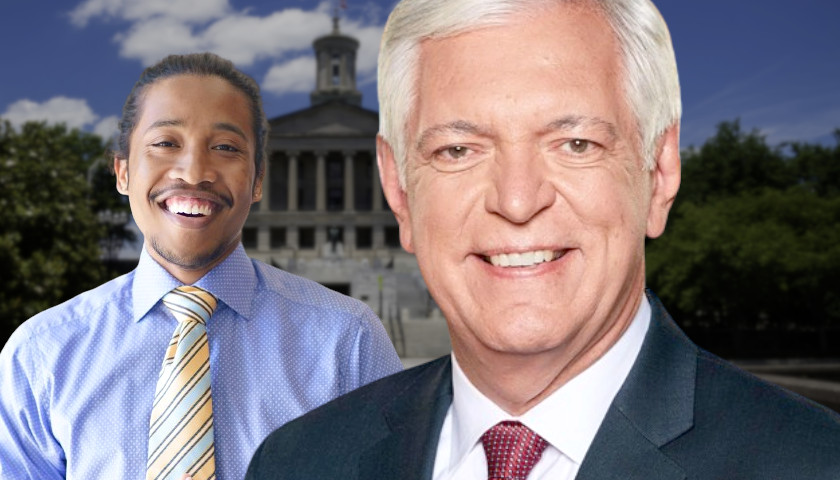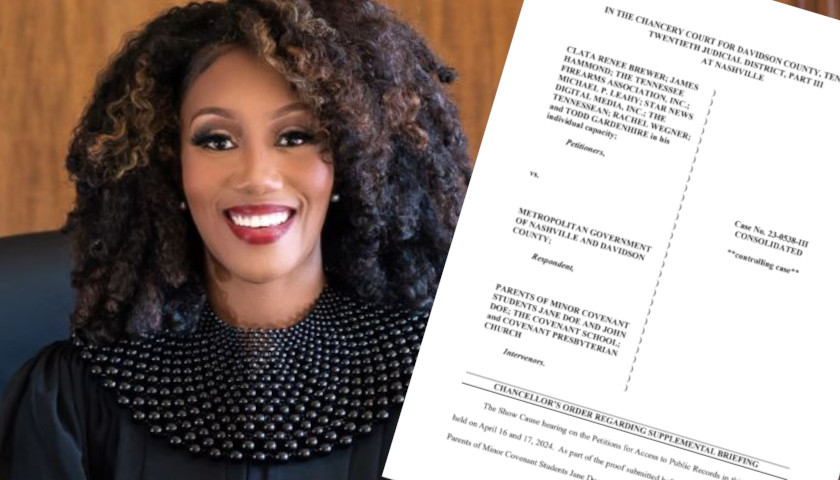On Tuesday’s Tennessee Star Report with Michael Patrick Leahy – broadcast on Nashville’s Talk Radio 98.3 and 1510 WLAC weekdays from 5:00 a.m. to 8:00 a.m. – Host Michael Patrick Leahy welcomed Tennessee State Senator Kerry Roberts (R-Springfield) in the studio to discuss the decision-making pattern of Governor Bill Lee.
During the second hour, Kerry discussed the Heartbeat Bill which received the same lack of consultation by many legislators that help create it.
Leahy: We are joined as we now always are on Tuesdays by our good friend State Senator Kerry Roberts. Good morning Kerry.
Roberts: Good morning. I’m out of breath. (Laughs)
Leahy: Before we get into the news of the day, Friday night you were the featured speaker at the 917 Society event.
Roberts: Yeah. Well, MC.
Leahy: The Master of Ceremonies.
Roberts: I did the comedy routine between the main acts. (Leahy chuckles)
Leahy: It’s a great organization. Joni Bryant founded it several years ago. And what they do is they give copies of the US constitutional to eight graders in Tennessee. It’s a great organization that we tip our hat to Joni. Chris Butler was there and reported on it. It was at the Tulip Grove Mansion.
Roberts: I’ve never been there before.
Leahy: And that’s built by Andrew Jackson-Donelson, the nephew of Andrew Jackson in the 1830s.
Roberts: I didn’t get the history of it.
Leahy: Quite a place, isn’t it?
Roberts: Yeah. It’s the first time I’ve been there and I’ve seen it from Lebanon road for many years. But never knew that it was part of the Hermitage complex because it’s on the other side of Lebanon road.
Leahy: It’s owned by the Andrew Jackson Foundation.
Roberts: They rent it out and do events there. It was a neat old house. We live in an old house built in the 1860s so I always got to check it out and I’m always looking at it and making mental notes.
Leahy: There are only 33 state senators in the entire state of Tennessee and you are one of them. We are delighted that you take the time to be here and talk with us about what’s going on in the Tennessee General Assembly and a first-hand look at it.
You know more about this bill than I do. There are certain issues I’ve covered. Like the refugee issue a lot. My eyes always glaze over about the Heartbeat Bill. You have really focused on it a lot and so I was surprised a little bit by the way Gov. Lee went about announcing that he will be submitting a Heartbeat Bill.
I’ll tell you what surprised me. Again, it took me a while to realize the issue here. Lee announced the Heartbeat Bill. Controversial in the last session. And you held a summer session study. Is that what you call it?
Roberts: Summer study.
Leahy: Summer study to talk about how to improve the bill so it would go past and stand court testing. Here is what I found interesting. Gov. Lee last week has his big announcement. He’s introducing the Heartbeat Bill, great. Except, here’s what I just found out afterward.
The details of the bill were not announced. And a couple of key players, legislators who’ve been working on it for a long time were not consulted on what was being quoted on the bill. And then two key interest groups, The Tennessee Right to Life and FACT.
Roberts: Family Action Council of Tennessee.
Leahy: Which David Fowler heads up. When the announcement was made they said we like the governor, and he’s a pro-life guy and we look forward to seeing what’s in the bill. Which translates to me say, gee governor, why didn’t you talk to us first? That’s a polite way of saying that. Please explain all this to us.
Roberts: I think, what they said was probably a shared sentiment. I’ve said this before and I’ll say it again, I absolutely love Bill Lee and think he’s a great person. And I know that 99% of the time we’re probably going to agree on the issues but this was an awkward situation for me because you are asked to be in support of something you haven’t seen yet. And it was the same kind of nuance that happened before.
Leahy: You mean with what happened before…
Roberts: with the Heartbeat Bill, yeah.
Roberts: This is one of the hardest things to go home and explain to a constituent. And that is, I’m for something but I’m voting against this bill. It sounds like the Wilson County thing. I was for it but now I’m against it. That’s what it sounds like to people and you’re saying the devil’s in the details.
Because sometimes you can see an unintended consequence in a bill that maybe nobody picked up on. Maybe you’ve got a sponsor that’s wedded to that language and they don’t want to amend the bill. So you find yourself conceptually in favor of something that you’re not able to vote for.
I remember Nancy Pelosi and Obamacare and we’ll know after we pass it and stuff. I’ve gotten into this thing of don’t ask me if I’m going to vote for something until you show me a bill and I have a chance to read it and I know what I’m voting on.
So I can sit here and say I’m pro-life and sit here and say I’m for this and against that. But all these bills that people say, would you vote the most common one. You’re going to vote on medical cannabis, show me a bill. Show me a bill. Now there’s one. The bill doesn’t say it’s now legal and that’s the end of the bill.
Leahy: These bills are complicated.
Roberts: They are complicated and they have a lot of that can go wrong.
Leahy: They are sometimes are written by people who well know the law and write it in ways that say one thing and then accomplish another at sometimes.
Roberts: A legislator doesn’t write the bill. The legislator may originate the idea of the bill, but then you go to the legal staff and say here’s what I want to accomplish. Can you get the language of this right? Look through the code and see if there are any code references. I need to change code here or change code there. And that’s what you rely on the legal staff for and sometimes things get lost in translation.
Leahy: Tennessee code annotated, which is when a law is passed, you put it into that code and if certain things become old and changed you’d make the changes. You can go out and see Tennessee code annotated and what the law is on every matter in the state as of today.
Roberts: Yes. And it’s big. If you imagine how big a Bible is. Imagine about 50 of those. That’s why we don’t have any crime in Tennessee. (Leahy laughs) That’s why nobody’s incarcerated.
Leahy: Because we have all these laws.
Roberts: And we all know that if you outlaw something nobody will do it right? So that’s the whole thing behind gun control right?
Leahy: But here’s what’s troubling to me. We’ve been critical on some aspects of Gov. Lee’s record. We clearly disagreed with his refugee decision big time. But we’ve praised elements of civic education and vocational education. But what’s troubling to me is this pattern of acting unilaterally without talking to interested parties.
This was the problem with the refugee decision and it appears to me, although there were again plenty of parties involved who could have helped in any design of this bill before the announcement was made. It doesn’t look like he talked to any of them.
Roberts: I don’t know who he talked to. I know who he did not talk to because I talked to David Fowler.
Leahy: He did not talk to David Fowler.
Roberts: They talked to him the Friday before which I think from David’s standpoint, I don’t want to speak for him. He’d be good to have on the show. It was in the eleventh hour. But then we get there on Thursday for the press conference and there’s no bill yet. So I don’t know really where they are in the process of formulating the bill.
Last year, we heard some legislators who grumbled about this. I didn’t find it to be a problem. I always felt like the administration was successful to me and the things that affected me or the legislation I was working on. I thought they communicated well.
There were some legislators who didn’t think that they did. The grace in his second term is a lot less. One thing to keep an eye on if legislators do feel that things are moving forward without their involvement or input then a relationship can sour very quickly. And I don’t want to see that happen.
Leahy: Well, that’s a little bit of the concern. We’ve been quite clear in the areas of which we disagree with the governor. It doesn’t serve anyone well in the state to have unnecessary contention on key issues.
Roberts: Right. Right. Right. It’s difficult for the first time in your life when you’re dealing with 99 House members and 33 Senators and you’ve not had to do that before. And you’ve not been in that environment. There are some sacred spaces that you don’t step on so to speak. Or sacred cows that you don’t poke. Or whatever your analogy. (Leahy laughs)
Listen to the full third hour:
– – –
Tune in weekdays from 5:00 – 8:00 am to the Tennessee Star Report with Michael Patrick Leahy on Talk Radio 98.3 FM WLAC 1510. Listen online at iHeart Radio.
Photo “Bill Lee” by Bill Lee. Background Photo by Bill Lee.









The phantom governor strikes again. Nice guy (I guess) but not much of a governor.